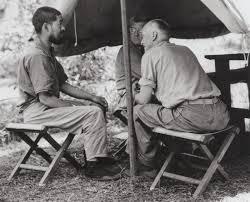Stephen Budiansky over at The Atlantic with a convincing look back at interrogation techniques that actually worked and were premised on treating the "enemy" like a human being:
Six months before the abuses at Abu Ghraib prison broke into public view, a small and fairly obscure private association of United States Marine Corps members posted on its Web site a document on how to get enemy POWs to talk.
The document described a situation very similar to the one the United States faces in the insurgencies in Iraq and Afghanistan: a fanatical and implacable enemy, intense pressure to achieve quick results, a brutal war in which the old rules no longer seem to apply.
Marine Major Sherwood F. Moran, the report's author, noted that despite the complexities and
difficulties of dealing with an enemy from such a hostile and alien culture, some American interrogators consistently managed to extract useful information from prisoners. The successful interrogators all had one thing in common in the way they approached their subjects. They were nice to them.
Moran was writing in 1943, and he was describing his own, already legendary methods of interrogating Japanese prisoners of war. More than a half century later his report remains something of a cult classic for military interrogators. The Marine Corps Interrogator Translator Teams Association (MCITTA), a group of active-duty and retired Marine intelligence personnel, calls Moran's report one of the "timeless documents" in the field and says it has long been "a standard read" for insiders. (A book about the Luftwaffe interrogator Hans Joachim Scharff, whose charm, easygoing manner, and perfect English beguiled many a captured Allied airman into revealing critical information, is another frequently cited classic in the field.) An MCITTA member says the group decided to post Moran's report online in July of 2003, because "many others wanted to read it" and because the original document, in the Marine Corps archives, was in such poor shape that the photocopies in circulation were difficult to decipher. He denies that current events had anything to do with either the decision to post the document or the increased interest in it.
But it is hard to imagine a historical lesson that would constitute a more direct reproach to recent U.S. policies on prisoner interrogation.
Do read the rest.
There's a lesson here, taken from The Good Book and taught as a central tenet of Catholicism. Every human being has dignity. No exceptions. Every.
Carry on.
 difficulties of dealing with an enemy from such a hostile and alien culture, some American interrogators consistently managed to extract useful information from prisoners. The successful interrogators all had one thing in common in the way they approached their subjects. They were nice to them.
difficulties of dealing with an enemy from such a hostile and alien culture, some American interrogators consistently managed to extract useful information from prisoners. The successful interrogators all had one thing in common in the way they approached their subjects. They were nice to them.